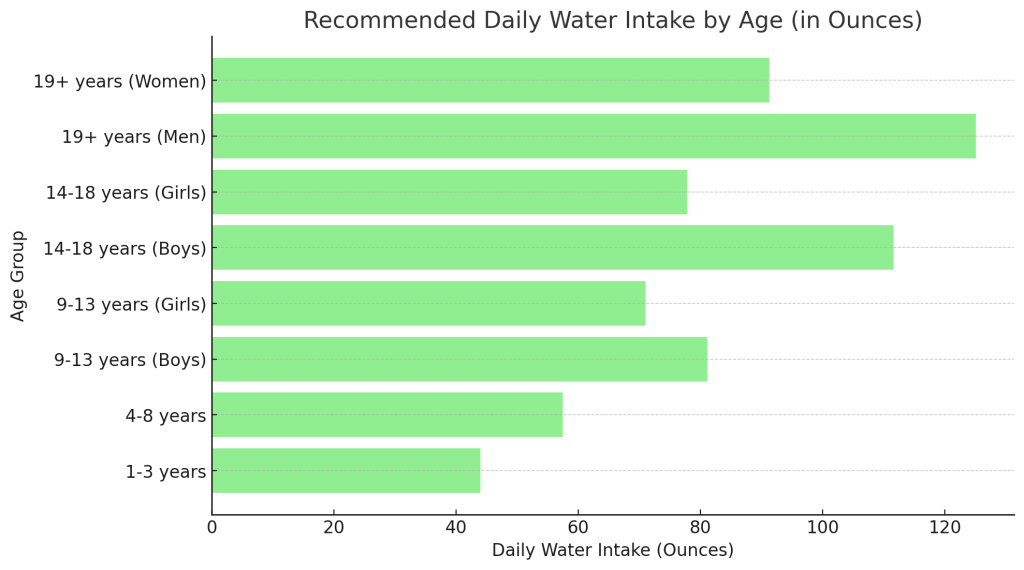
EZ Gel Plasma Filler: The Ultimate Answer to skin rejuvenation
Understanding the EZ Gel Plasma Filler: What It Is and How It Works As a Nurse Practitioner with years of experience in the field of
Home » Holistic Hydration Strategies: Wellness Tips for Mind, Body, and Soul

Explore Holistic Hydration Strategies for optimal health and discover tips on hydration for mind, body, and soul wellness.
When we talk about hydration, the first thing that often comes to mind is simply drinking water. But holistic hydration? That’s a whole different ball game. It’s not just about quenching thirst; it’s about nourishing every part of you – your mind, body, and soul.
First things first, let’s bust a myth: drinking eight glasses of water a day isn’t the one-size-fits-all solution we once thought it was. Every body is unique and has different hydration needs based on factors like age, activity level, and overall health. Holistic hydration takes this personalized approach, focusing on hydrating in a way that supports your entire being.
Our bodies are pretty smart. They know when they need water and aren’t shy about signaling us. Feeling thirsty? That’s your body’s way of waving a little flag saying, “Hey, I could use some hydration over here!” But here’s the kicker: sometimes, we misunderstand these signals. Ever felt hungry when you’re actually just dehydrated? Yep, it happens more often than you’d think.
It’s not just about how much you drink, but what you drink. Plain water is fantastic, but let’s not forget about other hydrating heroes. Think herbal teas, nutrient-rich broths, and water-rich fruits and veggies. These not only hydrate but also provide essential vitamins and minerals.
Did you know that even mild dehydration can affect your mood and cognitive functions? Staying well-hydrated is crucial for maintaining focus, memory, and emotional balance. It’s not just about physical wellness; it’s about mental clarity too.
There’s something inherently calming about sipping a warm cup of tea or enjoying a fresh, juicy fruit. It’s a moment of pause, a break in a hectic day. This aspect of hydration – the ritual, the sensory experience – feeds the soul.
Hydration isn’t just a feel-good practice; there’s solid science backing its importance. Understanding this can help us make smarter choices about how we hydrate.
Water isn’t just a thirst quencher – it’s a critical component of our bodies. It plays a key role in a myriad of physiological processes, from regulating body temperature to flushing out toxins and aiding in digestion. Every cell, tissue, and organ in our body needs water to function properly.
When we talk about hydration, we can’t ignore electrolytes – minerals like sodium, potassium, calcium, and magnesium that help balance the amount of water in the body. They’re crucial for maintaining nerve and muscle function and can be replenished through a balanced diet or electrolyte-enhanced drinks, especially after intense exercise or sweating.
For those of us who lead active lifestyles or engage in regular exercise, hydration takes on an extra layer of importance. Adequate hydration enhances physical performance, reduces the risk of heat stress, and helps in quicker recovery. Remember, by the time you feel thirsty, you’re already slightly dehydrated, so proactive hydration is key.
Research has linked proper hydration to a reduced risk of chronic diseases like kidney stones, urinary tract infections, and even some types of cancer. It’s not a magic cure, but it’s a foundational aspect of overall health and disease prevention.
It’s not just about chugging water. Overhydration or drinking too much water in a short period can lead to water intoxication, which, although rare, is serious. The key is to listen to your body and hydrate consistently throughout the day.
In a world that often feels like it’s running at a million miles an hour, practicing mindful hydration is a way to slow down, reconnect with ourselves, and give our bodies what they need.
Mindful hydration is about more than just drinking water; it’s about being fully present in the moment of hydrating. This means paying attention to the act of drinking – noticing the temperature of the water, the sensation as it flows down your throat, and the feeling of refreshment it brings.
Being mindful about hydration also involves making intentional choices about what we drink. It’s choosing a nourishing herbal tea over a sugary soda, recognizing that what we put into our bodies impacts not just our physical health, but our mental and emotional wellbeing too.
Our bodies are constantly communicating with us, but in the hustle and bustle of daily life, we often don’t listen. Mindful hydration encourages us to tune in to our body’s signals. Are you really hungry, or just dehydrated? Is that afternoon fatigue a sign you need a caffeine boost, or just some good old H2O?
Creating small rituals around hydration can transform it from a mundane task to a nourishing practice. Maybe it’s starting your day with a warm cup of lemon water or taking a mid-afternoon break with a refreshing herbal infusion. These rituals not only hydrate us but also provide a moment of calm and centeredness.
At its core, mindful hydration is a form of self-care. It’s a simple yet powerful way to show ourselves some love. By paying attention to our hydration needs, we’re respecting and honoring our body’s innate wisdom.
Hydration isn’t just about what you drink; it’s also about what you eat. There are many foods and drinks that can significantly contribute to your hydration levels, offering a tasty and varied way to keep your body nourished and hydrated.
Mother Nature has provided us with a bounty of hydrating foods. Fruits like watermelon, strawberries, and cucumbers are not only delicious but are also packed with water. Eating these can help boost your hydration levels, especially during hot summer days or after a workout.
Herbal teas are a fantastic way to stay hydrated while also reaping the benefits of various herbs. Peppermint tea can be refreshing, chamomile can be calming, and ginger tea can aid digestion. Plus, they’re a great way to stay warm and hydrated during colder months.
Sipping on a warm, homemade broth is not only comforting but also a great way to hydrate and get essential minerals. Bone broths, in particular, are rich in electrolytes, making them an excellent choice for hydration.
Coconut water is a natural, healthy alternative to commercial sports drinks. It’s high in potassium and other electrolytes, making it perfect for rehydration after physical activity or during hot weather.
Smoothies are a fantastic way to combine hydration with nutrition. Blending fruits with water, coconut water, or herbal teas can create a delicious, hydrating, and nutrient-dense drink.
Infusing water with fruits, herbs, or cucumbers not only adds a refreshing twist but also encourages you to drink more. It’s a simple and effective way to make hydration more enjoyable.
Often overlooked, the relationship between hydration and mental health is as essential as it is profound. Staying adequately hydrated can have a significant impact on our mental and emotional well-being.
Our brain is about 75% water, and even slight dehydration can affect its functioning. Proper hydration is crucial for maintaining concentration, memory, and brain performance. Dehydration can lead to brain fog, mood swings, and increased feelings of anxiety and stress.
Studies have shown that there’s a direct link between hydration and mood. Dehydration can lead to feelings of irritability, while staying hydrated can help maintain a more balanced and positive mood.
Hydration plays a role in managing stress and anxiety. Adequate hydration helps to ensure that the body’s systems are functioning well, reducing physical stressors that can exacerbate feelings of anxiety.
There’s a clear correlation between hydration and cognitive function. Adequate hydration helps to maintain alertness and sharpness of mind, aiding in decision-making, problem-solving, and creativity.
In our fast-paced world, mental fatigue is a common issue. Hydration can be a simple, yet effective strategy to combat this. It helps to refresh the mind, boost energy levels, and improve overall cognitive performance.
To fully embrace holistic hydration, it’s important to incorporate strategies that go beyond just drinking water. Here are some tips and techniques to enhance your physical wellness through hydration.
Begin your day with a glass of water. It’s a simple yet effective way to kickstart your hydration after a night’s sleep. For an added boost, try warm water with lemon to stimulate digestion and metabolism.
If you’re physically active, it’s crucial to hydrate before, during, and after exercise. This helps maintain performance, prevent dehydration, and aid in recovery. Don’t wait until you’re thirsty; keep sipping small amounts regularly.
Everyone’s hydration needs are different. Factors like body weight, climate, diet, and activity levels all play a role. Pay attention to your body’s cues and adjust your hydration accordingly.
In this era of smart technology, there are apps and devices that can remind you to hydrate and track your water intake. These tools can be especially helpful if you’re busy and tend to forget to drink water.
A diet rich in fruits, vegetables, and whole foods naturally increases your water intake. Foods with high water content not only hydrate but also provide essential nutrients and fiber.
Find ways to make hydration enjoyable. Whether it’s experimenting with fruit-infused waters, trying different herbal teas, or using a favorite water bottle, the more pleasant it is, the more likely you are to stick with it.
Hydration is more than a physical necessity; it plays a crucial role in our emotional health and well-being.
There’s a strong link between hydration and emotional stability. Dehydration can lead to increased feelings of anxiety and irritability, while proper hydration can help maintain a calm and balanced mood.
Drinking water can be a simple yet effective way to help reduce stress. The act of drinking water can be soothing, and maintaining hydration helps the body and mind to function optimally, reducing the physiological impacts of stress.
Good hydration can positively impact your sleep quality. Dehydration can disrupt sleep patterns and lead to restlessness, while staying hydrated throughout the day can promote a more restful night’s sleep.
Creating rituals around hydration, like enjoying a cup of herbal tea or sipping water in a peaceful setting, can provide moments of tranquility and mindfulness, contributing positively to emotional well-being.
It’s important to recognize the emotional signs of dehydration, which can include feelings of overwhelm, fatigue, and difficulty concentrating. By responding to these signals with mindful hydration, we can support our emotional health.
Hydration plays a pivotal role in the aging process and can be one of your best allies in maintaining youthfulness and vitality.
Water is often referred to as the ‘fountain of youth’ due to its vital role in keeping our skin plump, elastic, and resilient. Proper hydration helps to reduce the appearance of fine lines and wrinkles, giving the skin a more youthful, radiant glow.
On a cellular level, hydration is crucial for maintaining the health of our cells. Well-hydrated cells function better, repair themselves more efficiently, and can better combat the signs of aging.
One of the keys to anti-aging is the body’s ability to detoxify efficiently. Hydration aids in flushing toxins out of the body, supporting liver and kidney function, and promoting overall health and longevity.
Hydration is essential for joint health. The cartilage in joints is composed mainly of water, which helps to reduce friction and wear, thereby preventing joint pain and degeneration.
Staying hydrated is also vital for maintaining cognitive function as we age. Proper hydration helps in maintaining focus, memory, and cognitive agility, reducing the risk of age-related cognitive decline.
Adequate hydration is key to maintaining energy levels and vitality. Dehydration can lead to fatigue and lethargy, while staying hydrated helps to keep energy levels up and supports overall vitality.
Incorporating herbal infusions and teas into our hydration routine can offer a wealth of health benefits, blending hydration with the healing properties of various herbs.
For centuries, different cultures have used herbal teas for their medicinal properties. Herbs like chamomile, peppermint, and ginger have been revered for their ability to soothe, heal, and rejuvenate the body and mind.
Herbal teas provide a hydrating experience that goes beyond simple water intake. They can aid in digestion, reduce inflammation, promote relaxation, and even support the immune system, depending on the herbs used.
Herbal infusions are a fantastic alternative to caffeinated beverages. They hydrate without the dehydrating effects of caffeine, offering a healthier option for those looking to reduce their caffeine intake.
The variety of herbal teas available means there’s always something new to try. From the calming properties of lavender to the invigorating taste of hibiscus, herbal teas can bring enjoyment and diversity to your hydration habits.
Preparing and enjoying a cup of herbal tea can be a relaxing ritual, offering a moment of tranquility in your day. This practice not only hydrates the body but also soothes the mind and spirit.

Hydration is a lifelong journey, with our needs changing as we move through different stages of life. Understanding these changes can help us tailor our hydration strategies for optimal health at any age.
Young bodies are more susceptible to dehydration, making it crucial for children and teenagers to drink enough fluids. Encouraging healthy hydration habits early on – like choosing water over sugary drinks – sets the foundation for a lifetime of good health.
For expectant and new mothers, hydration becomes even more important. Adequate hydration supports the increased blood volume during pregnancy and is essential for breast milk production during breastfeeding.
Active adults, especially those who engage in regular exercise, have higher hydration needs. Keeping well-hydrated aids in physical performance, recovery, and overall energy levels.
As we age, our sense of thirst diminishes, making older adults more prone to dehydration. Ensuring regular fluid intake is vital for maintaining kidney function, cognitive health, and overall well-being in the elderly.
For individuals managing certain health conditions like diabetes or heart disease, hydration plays a key role in symptom management and overall health. It’s important to understand how specific conditions affect hydration needs and adjust accordingly.
Our hydration needs can vary with the seasons. Hotter temperatures increase the need for fluids, while colder weather can reduce the sense of thirst. Adjusting your hydration strategies seasonally ensures your body gets what it needs year-round.
While we understand the importance of hydration, actually maintaining it can sometimes be a challenge. Here are some practical solutions to common hydration hurdles.
For those always on the move, carrying a reusable water bottle can be a game-changer. It’s an easy reminder to drink water throughout the day, and it’s good for the environment too!
If plain water doesn’t excite you, try infusing it with fruits, herbs, or cucumber for a refreshing twist. Not only does it add flavor, but it also provides additional nutrients.
In the hustle and bustle of daily life, it’s easy to forget to hydrate. Setting reminders on your phone or using a hydration tracking app can help keep you on track.
If the taste of your tap water is off-putting, consider using a water filter. Filtered water often tastes better, encouraging you to drink more.
Headaches can often be a sign of dehydration. If you’re prone to them, make sure you’re drinking enough fluids throughout the day, especially if you’re spending time in hot weather or engaging in physical activity.
Travel, especially air travel, can be dehydrating. Make sure to drink water before, during, and after your flight. Avoid alcohol and caffeine on the plane, as they can exacerbate dehydration.
A holistic hydration plan is about more than just drinking water; it’s about understanding and responding to your body’s unique needs in a way that supports your overall health and well-being.
Your hydration needs depend on several factors, including your age, weight, activity level, and climate. Start by assessing these factors to understand how much fluid your body needs daily.
Remember, hydration comes from more than just water. Include herbal teas, hydrating foods like fruits and vegetables, and natural beverages like coconut water in your plan.
Create a routine that incorporates regular fluid intake throughout the day. This could be drinking a glass of water first thing in the morning, having a cup of herbal tea mid-afternoon, or hydrating with a smoothie after exercise.
Pay attention to your body’s cues. Thirst, dry skin, fatigue, and dark urine are signs that you need more fluids. Adjust your hydration plan accordingly to respond to these signals.
Find ways to make hydration enjoyable – use a favorite water bottle, try new fruit infusions, or set a goal to try a new herbal tea each week. The more enjoyable it is, the more likely you are to stick with it.
Regularly review your hydration habits and make adjustments as needed. Your hydration needs may change with the seasons, your health, and your lifestyle.
Choosing Enhanced Aesthetics & Wellness for your holistic hydration needs is a decision that aligns with caring for your overall health and well-being. Here’s why:
Contact Enhanced Aesthetics & Wellness today to embark on a journey to better health with their expert holistic hydration strategies.
Here are some frequently asked questions related to Holistic Hydration Strategies, offering insights and practical advice for those looking to enhance their wellness journey.
Holistic Hydration Strategies encompass more than just drinking water. They involve understanding and meeting your body’s hydration needs through a variety of sources, including water-rich foods, herbal teas, and mindful drinking practices. This approach takes into account the entire well-being of an individual – physical, mental, and emotional.
Hydration is essential because it affects every bodily function. It helps in maintaining body temperature, removing waste, lubricating joints, and facilitating proper digestion. Proper hydration also impacts cognitive function, mood, and energy levels.
Signs of proper hydration include having a light yellow or clear urine color, feeling well-hydrated without excessive thirst, and having regular bowel movements. Other indicators include good energy levels and clear mental functioning.
Natural hydration boosters include fruits and vegetables like cucumbers, celery, oranges, and watermelons. Herbal teas and coconut water are also excellent for boosting hydration while providing additional health benefits.
Yes, hydration can significantly affect your mood and mental health. Dehydration can lead to feelings of irritability, fatigue, and difficulty concentrating, while staying hydrated can improve mood, cognitive function, and overall mental well-being.
Start by increasing your intake of water and water-rich foods. Establish a routine that includes drinking water throughout the day, and try infusing your water with fruits or herbs for variety. Also, consider replacing high-caffeine or sugary drinks with herbal teas or natural beverages.

Understanding the EZ Gel Plasma Filler: What It Is and How It Works As a Nurse Practitioner with years of experience in the field of

Looking for the best medical weight loss clinic near me? Get real results at Enhanced Aesthetics & Wellness.
Subscribe to our newsletter and be the first to know about our latest news and special offers!
"*" indicates required fields

Sherry Cipollini
APRN, FNP-BC
Family Nurse Practitioner
Copyright © 2024 Enhanced Aesthetics & Wellness. All Rights Reserved.